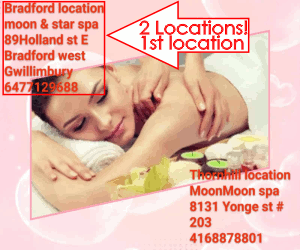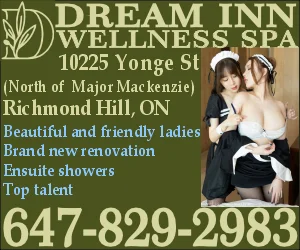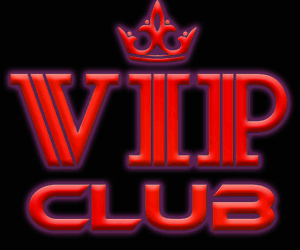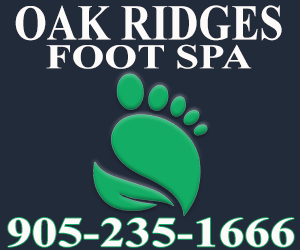- EMSpa_schedule:
Tomorrow's sneak peek: On Saturday May 10, 2025, our attendants will be Vicky
 , Ivy
, Ivy  , Lucy
, Lucy  , Opal
, Opal  and Sophie ☀. Call us at
and Sophie ☀. Call us at  (905) 479-6668
(905) 479-6668 to book!
to book! - srayment:
Shangri La
- wilson holistic centre:

 Beautiful Korean girl working at 382 Wilson Ave
Beautiful Korean girl working at 382 Wilson Ave 


 416-840-0071
416-840-0071

- Lilyspa1:
Lily Spa :

 SuSu ( Asian )Slim ,
SuSu ( Asian )Slim , 
 Porn Service
Porn Service 
 Elena 22, Latino French, 36 DDD and
Elena 22, Latino French, 36 DDD and 
 ASS,
ASS, 
 Vicky 22, Philippine mixed White , very open-Minded ,
Vicky 22, Philippine mixed White , very open-Minded ,  bbbj , DFk
bbbj , DFk  Duo
Duo  ,
, 6475318288
6475318288 - SugarLoveSpa:
Sugar Love Spa . today have


 ella, tiffany, ana, chrishtina
ella, tiffany, ana, chrishtina 

 come to enjoy and all service available... Sugar Love spa
come to enjoy and all service available... Sugar Love spa
 (437) 365-2688
(437) 365-2688









- 89moonstar&MoonMoon:
MoonMoon spa/416 887 8801/8131Yonge st #203 Spanish Latin &22ys Colombia girl today &&& Bradford location:Moonstar Spa 6477129688 / 89 Holland st E Bradford west Gwillimbury 2 hot young girls today
- Soul Relax Spa:
 Looking for a relaxing escape?
Looking for a relaxing escape?  Click Here Meet
Click Here Meet Kim
Kim Isabella
Isabella MandyCall us today for the best treatment and service experience. Click on our Username and FOLLOW US for updates ! Call now ☎ 289 - 298 - 5662
MandyCall us today for the best treatment and service experience. Click on our Username and FOLLOW US for updates ! Call now ☎ 289 - 298 - 5662 Your ultimate relaxation awaits!
Your ultimate relaxation awaits! 
- SL East Spa:
 ♀
♀ HAPPY Friday!!!
HAPPY Friday!!! Ultimate destination for Asian massages
Ultimate destination for Asian massages Two fab spots: SL Richmond Hill & SL West Oakville
Two fab spots: SL Richmond Hill & SL West Oakville  Your passport to paradise with 10 enchanting girls fr China, HK, Japan & Korea —
Your passport to paradise with 10 enchanting girls fr China, HK, Japan & Korea —  36D Flora, Cindy, Cici, Eva, Coco, JPN Yui, Happy, Cindy, Jasmine & Aaliyah — pamper yourself
36D Flora, Cindy, Cici, Eva, Coco, JPN Yui, Happy, Cindy, Jasmine & Aaliyah — pamper yourself
 Ring us
Ring us  647-695-6354 or text us
647-695-6354 or text us  647-578-8169
647-578-8169 160 East Beaver Cr., Unit 12, RichmondHill
160 East Beaver Cr., Unit 12, RichmondHill  Where Eastern charm meets Western comfort - your bliss
Where Eastern charm meets Western comfort - your bliss - Nu spring spa888:


 sexy hot busty Malaysian
sexy hot busty Malaysian  Germany
Germany  Indian
Indian  korean girls
korean girls
 working
working 
 at markham
at markham  416-669-8508
416-669-8508


- DareDevil:
272 ARIA WELLNESS

 ADDRESS: 360 HWY 7, UNIT #6, RICHMOND HILL
ADDRESS: 360 HWY 7, UNIT #6, RICHMOND HILL
 ,647-222-5683 (PHONES CALL ONLY, NO TEXT'N AVAILABLE)
,647-222-5683 (PHONES CALL ONLY, NO TEXT'N AVAILABLE)  TODAY'S Schedule!
TODAY'S Schedule! Loaded lineup with Young Beautiful Girls : Ellagant Ella, Magical Mia and Work out🏋
Loaded lineup with Young Beautiful Girls : Ellagant Ella, Magical Mia and Work out🏋
 Babe Amy! BUY 10 HOURS (GET 11 HOURS) **TODAY'S PICK OF THE DAY ARE
Babe Amy! BUY 10 HOURS (GET 11 HOURS) **TODAY'S PICK OF THE DAY ARE
 Ella
Ella

- Golden Sunshine Spa:
 Click on our Username and FOLLOW US for updates and special services !
Click on our Username and FOLLOW US for updates and special services !  Click Here Today
Click Here Today Cindy
Cindy Jessica
Jessica Chelsea
Chelsea Selina
Selina Nina Call us ☎ 905 - 265 - 2158
Nina Call us ☎ 905 - 265 - 2158 Your ultimate service awaits!
Your ultimate service awaits! 
- wilson holistic centre:

 Beautiful Korean girl working at 382 Wilson Ave
Beautiful Korean girl working at 382 Wilson Ave 


 416-840-0071
416-840-0071

- Jenny’s Spa:

 JENNY’S SPA
JENNY’S SPA

 5170 DUNDAS STREET WEST
5170 DUNDAS STREET WEST
 ETOBICOKE ONTARIO M9A 1C4
ETOBICOKE ONTARIO M9A 1C4
 ( 647-893-5196)
( 647-893-5196) Call or Text
Call or Text  ( 437-888-3759)
( 437-888-3759) Call Only (ETOBICOKE) OPEN 10am to 9pm MONDAY to SUNDAY
Call Only (ETOBICOKE) OPEN 10am to 9pm MONDAY to SUNDAY 
 GRAND OPENING
GRAND OPENING NEW GIRLS EVERYDAY
NEW GIRLS EVERYDAY EXCELLENT MASSAGE + SERVICE QUEENS NOW AVAILABLE AT JENNY’S SPA FOR ALL YOUR MASSAGE AND SPECIAL EXTRA NEEDS
EXCELLENT MASSAGE + SERVICE QUEENS NOW AVAILABLE AT JENNY’S SPA FOR ALL YOUR MASSAGE AND SPECIAL EXTRA NEEDS





 TWO BEAUTIFUL NEW YOUNG ASIAN GIRLS EVERYDAY
TWO BEAUTIFUL NEW YOUNG ASIAN GIRLS EVERYDAY
 REAL PICTURES OF ATTENDANTS
REAL PICTURES OF ATTENDANTS

 Limited Time Special Promotion
Limited Time Special Promotion


 30 Minutes Nude Mass
30 Minutes Nude Mass - Spa in Markham:
- Moneylee:
All season wellness center : New Young girl big breasted beautiful buttocks charming temperament big boobs Mia,young girl pretty face nice figure Thai deep massage Aad,Young girl big breasted beautiful buttocks charming temperament big boobs Yoyo,Young girl Big breasted saucy naughty Ella ,Enchanting sexy petite deep massage Sherry
 address: #5-30 Rambler dr Brampton ,Ontario L6W 1E2
address: #5-30 Rambler dr Brampton ,Ontario L6W 1E2 4376655510
4376655510 



 ️
️ ️
️

- Moneylee:
Full season wellness center: New Young girl big breasted beautiful buttocks charming temperament big boobs Ivy , Young girl pretty face big boobs nice figure deep massage Jessica ,Young girl Big-breasted big Big boobs big butts Linda , Young beautiful face sexy body and good deep massage Maggie,Enchanting sexy petite deep massage Mary .
 2560 Shepard Ave Mississauga unit 1
2560 Shepard Ave Mississauga unit 1  4379857899
4379857899 



 ️
️ ️
️

- BlueXado Therapy & Spa:
 BlueXado – 1102 Centre St, Thornhill
BlueXado – 1102 Centre St, Thornhill  416-357-9797 | 416-678-8668 Kelly
416-357-9797 | 416-678-8668 Kelly  , Amy
, Amy  , Julie
, Julie  (10–12AM)
(10–12AM)  Book Now
Book Now - Pink Flower Spa:
 Pink Flower – 3300 McNicoll Ave, Scarborough
Pink Flower – 3300 McNicoll Ave, Scarborough  416-299-5515 | 416-817-3839 Elina
416-299-5515 | 416-817-3839 Elina  , Mady
, Mady  , Amira
, Amira  , Candy
, Candy  (10–9PM)
(10–9PM)  Book Now
Book Now - wonderspa:
 welcome to wonder spa
welcome to wonder spa 416-5000-800,L6a4H8,open10 to10,Ensuit shower available
416-5000-800,L6a4H8,open10 to10,Ensuit shower available  beautiful young Jessica deep tissue to relax massage back walk,hot stone
beautiful young Jessica deep tissue to relax massage back walk,hot stone long hair vietname Amy is very good looking,slim body ,nice body slide sweet sensual touch
long hair vietname Amy is very good looking,slim body ,nice body slide sweet sensual touch  beautiful sexy face ,big boob Joey ,amazing massage, starting to ending,really popular girl,must try
beautiful sexy face ,big boob Joey ,amazing massage, starting to ending,really popular girl,must try


- bnwellness_wilson:
We have 4 young girls are working today, young sweet Taiwanese Victoria 25’s slime open mind and young flirty Tina with sexy body open mind 30’s,young pretty Lily 25’s with curve body and Cute GFE Lina are providing deep tissue massage, pls call 4163985777 book appointment and walk in always welcome,back entrance and parking available, 350 Wilson Ave North York
- ForeverWarden:
Friday at




 𝓕𝓞𝓡𝓔𝓥𝓔𝓡 𝓢𝓟𝓐
𝓕𝓞𝓡𝓔𝓥𝓔𝓡 𝓢𝓟𝓐



 2190 Warden Ave, Unit 201, Scarborough 𝟰𝟭𝟲-𝟴𝟬𝟬-𝟳𝟴𝟴𝟳 : Bobo, Mimi & Sasa. Bobo is a small, slim and sexy lady, petite with all natural busty melons for your enjoyment. Mimi is a nice slim lady with a big bottom, & great oral skills to take you to paradise. Sasa is a slim & sweet Korean lady, about 5’4” with C Cups.
2190 Warden Ave, Unit 201, Scarborough 𝟰𝟭𝟲-𝟴𝟬𝟬-𝟳𝟴𝟴𝟳 : Bobo, Mimi & Sasa. Bobo is a small, slim and sexy lady, petite with all natural busty melons for your enjoyment. Mimi is a nice slim lady with a big bottom, & great oral skills to take you to paradise. Sasa is a slim & sweet Korean lady, about 5’4” with C Cups. - Annie Spa:

 ANNIE SPA
ANNIE SPA

 7-1001 SANDHURST CIRCLE
7-1001 SANDHURST CIRCLE
 SCARBOROUGH ON M1V 1Z6
SCARBOROUGH ON M1V 1Z6
 (647) 891-9688
(647) 891-9688
 (416) 291-8879
(416) 291-8879 (FINCH & MCCOWAN) OPEN 9:30am to 9pm MONDAY to SUNDAY
(FINCH & MCCOWAN) OPEN 9:30am to 9pm MONDAY to SUNDAY 
 NEW MANAGEMENT
NEW MANAGEMENT NEW GIRLS
NEW GIRLS

 GORGEOUS NEW YOUNG ASIAN GIRLS - TODAY’s ROSTER INCLUDES:
GORGEOUS NEW YOUNG ASIAN GIRLS - TODAY’s ROSTER INCLUDES:  Ivy
Ivy
 A stunning new Korean massage girl with a captivating presence, long silky brown hair cascading down her back, and a petite, elegant figure that exudes charm. Her warm touch and intuitive skills promise a deeply relaxing
A stunning new Korean massage girl with a captivating presence, long silky brown hair cascading down her back, and a petite, elegant figure that exudes charm. Her warm touch and intuitive skills promise a deeply relaxing - HolidaySpa:
Friday at


 𝓗𝓸𝓵𝓲𝓭𝓪𝔂 𝓢𝓹𝓪
𝓗𝓸𝓵𝓲𝓭𝓪𝔂 𝓢𝓹𝓪

 3517 Kennedy Rd, Unit 4, Scarborough
3517 Kennedy Rd, Unit 4, Scarborough  𝟰𝟯𝟳-𝟮𝟰𝟳-𝟭𝟭𝟵𝟵
𝟰𝟯𝟳-𝟮𝟰𝟳-𝟭𝟭𝟵𝟵 : FIONA, LINA & CINDY. FIONA is a slim hottie with long dark hair, great melons and ass, and nice services. LINA is very well known for her great services and her impressive shapely ass. Come and see why! You will be glad you did. CINDY is a slim & incredibly sexy lady with
: FIONA, LINA & CINDY. FIONA is a slim hottie with long dark hair, great melons and ass, and nice services. LINA is very well known for her great services and her impressive shapely ass. Come and see why! You will be glad you did. CINDY is a slim & incredibly sexy lady with - AliceSpa:
FRIDAY at 𝗔𝗟𝗜𝗖𝗘 𝗦𝗣𝗔, 4915 Steeles Ave. E, Scarborough 𝟰𝟭𝟲-𝟮𝟵𝟴-𝟬𝟴𝟵𝟴. 3 ladies waiting for you. Two Very Hot ladies (Qiqi & Summer) have returned to Alice spa today. Open 10am to 9pm: JOJO: is a busty JAPANESE girl, nice DD Cup boobs, short, petite small body, pretty face AV S2tar, bbbj cim cof rim, special services available. LUCKY (11:30am-9pm): is Vietnamese, small body, busty D
- Lilyspa1:
Lily Spa :

 SuSu ( Asian )Slim ,
SuSu ( Asian )Slim , 
 Porn Service
Porn Service 
 Elena 22, Latino French, 36 DDD and
Elena 22, Latino French, 36 DDD and 
 ASS,
ASS, 
 Vicky 22, Philippine mixed White , very open-Minded ,
Vicky 22, Philippine mixed White , very open-Minded ,  bbbj , DFk
bbbj , DFk  Duo
Duo  ,
, 6475318288
6475318288 - Lulu1980:
Phoenix Blossom Spa


 3 girls
3 girls  Table shower 、body scrub 、 Sea salt bath
Table shower 、body scrub 、 Sea salt bath 5124 Dundas St W Etobicoke
5124 Dundas St W Etobicoke 416-817-3366
416-817-3366 Young girl Cherry (Student)
Young girl Cherry (Student)
 “charming breasts.”beautiful curvy hips.”very provocative service
“charming breasts.”beautiful curvy hips.”very provocative service

 , professional super Luna deep tissue massage, has therapeutic effect to loosen bones and relieve muscle pressure and will bring you unexpected service effects, she will bring you a little surprise
, professional super Luna deep tissue massage, has therapeutic effect to loosen bones and relieve muscle pressure and will bring you unexpected service effects, she will bring you a little surprise



 You are welcome to make an appointment at any time or walk in the
You are welcome to make an appointment at any time or walk in the - Lulu_Villa_Spa:
Jessica Pretty Girl with amazing personality and super easy to get along with. Sasa friendly Vietnamese Judy is a gorgeous model type Vietnamese Girl Sami Vietnamese Girl Cherry
 From Malaysia Part time School girl
From Malaysia Part time School girl  647- 446-0886
647- 446-0886 - DareDevil:
Blackpink Wellness

 90 Marycroft Ave. Unit #2, Vaughan,
90 Marycroft Ave. Unit #2, Vaughan, 
 ON L4L 5Y1 (647) 395-3188. BEAUTIFUL AND SEXY GIRLS TODAY:
ON L4L 5Y1 (647) 395-3188. BEAUTIFUL AND SEXY GIRLS TODAY:  Superstar Julie, Sexy Akino and Beautiful Tiffany on duty
Superstar Julie, Sexy Akino and Beautiful Tiffany on duty .
. - DareDevil:
ARIA WELLNESS

 ADDRESS: 360 HWY 7, UNIT #6, RICHMOND HILL
ADDRESS: 360 HWY 7, UNIT #6, RICHMOND HILL
 ,647-222-5683 (PHONES CALL ONLY, NO TEXT'N AVAILABLE)
,647-222-5683 (PHONES CALL ONLY, NO TEXT'N AVAILABLE)  TODAY'S Schedule!
TODAY'S Schedule! Loaded lineup with Young Beautiful Girls : Ellagant Ella, Magical Mia and Work out🏋
Loaded lineup with Young Beautiful Girls : Ellagant Ella, Magical Mia and Work out🏋
 Babe Amy! BUY 10 HOURS (GET 11 HOURS) **TODAY'S PICK OF THE DAY ARE
Babe Amy! BUY 10 HOURS (GET 11 HOURS) **TODAY'S PICK OF THE DAY ARE
 Ella
Ella

- EMSpa_schedule:
Tomorrow's sneak peek: On Friday May 9, 2025, our attendants will be Vicky
 , Ada
, Ada  , Carla ❤, Cici
, Carla ❤, Cici  and Opal
and Opal  . Call us at
. Call us at  (905) 479-6668
(905) 479-6668 to book!
to book! - wilson holistic centre:
new girl works at
 535 Evans Ave today
535 Evans Ave today 



 416-531-6969
416-531-6969

- Lilyspa1:
Lily Spa :

 SuSu ( Asian )Slim ,
SuSu ( Asian )Slim , 
 Porn Service
Porn Service 
 Elena 22, Latino French, 36 DDD and
Elena 22, Latino French, 36 DDD and 
 ASS,
ASS, 
 Vicky 22, Philippine mixed White , very open-Minded ,
Vicky 22, Philippine mixed White , very open-Minded ,  bbbj , DFk
bbbj , DFk  Duo
Duo  ,
, 6475318288
6475318288 - EMSpa_schedule:
Hey! Where have you been? Today (Thursday), our amazing attendants are Ada
 , Cici
, Cici  , Vicky
, Vicky  , Sophie
, Sophie  and Monica
and Monica  . Call us at
. Call us at  (905) 479-6668
(905) 479-6668  to book your favourite and head on over to 7665 Kennedy Road, Unit 4, Markham!
to book your favourite and head on over to 7665 Kennedy Road, Unit 4, Markham! - SL East Spa:
 ♀
♀ Terrific Thursday
Terrific Thursday  Ultimate destination for Asian massages
Ultimate destination for Asian massages Two fab spots: SL Richmond Hill & SL West Oakville
Two fab spots: SL Richmond Hill & SL West Oakville  Your passport to paradise with 10 enchanting girls fr China, HK —
Your passport to paradise with 10 enchanting girls fr China, HK —  Tiffany, Joey, Julie, Aaliyah, Cici, Coco, Yui, Meghan, Julia & New 34D Jasmine—— ready to pamper you
Tiffany, Joey, Julie, Aaliyah, Cici, Coco, Yui, Meghan, Julia & New 34D Jasmine—— ready to pamper you
 Ring us
Ring us  647-695-6354 or text us
647-695-6354 or text us  647-578-8169
647-578-8169 160 East Beaver Cr., Unit 12, RichmondHill
160 East Beaver Cr., Unit 12, RichmondHill  Where Eastern charm meets Western comfort - your bliss awaits
Where Eastern charm meets Western comfort - your bliss awaits - Nu spring spa888:


 sexy hot busty
sexy hot busty  Indian
Indian 
 korean girls
korean girls
 working
working 
 at markham
at markham  416-669-8508
416-669-8508


- Lulu1980:
Phoenix Blossom Spa


 Table shower body scrub Sea Salt Bath
Table shower body scrub Sea Salt Bath every day 3 girls
every day 3 girls 

 5124 Dundas St W Etobicoke
5124 Dundas St W Etobicoke 416-817-3366
416-817-3366 Nice girl Mia
Nice girl Mia  Natural Big Boobs 36 DD
Natural Big Boobs 36 DD  Pink Mini Nipples Hot body slide, super enjoyable
Pink Mini Nipples Hot body slide, super enjoyable


 very provocative service
very provocative service

 , professional super Luna deep tissue massage, back walking has therapeutic effect to loosen bones and relieve muscle pressure and will bring you unexpected service effects, she will b
, professional super Luna deep tissue massage, back walking has therapeutic effect to loosen bones and relieve muscle pressure and will bring you unexpected service effects, she will b - Jenny’s Spa:

 JENNY’S SPA
JENNY’S SPA

 5170 DUNDAS STREET WEST
5170 DUNDAS STREET WEST
 ETOBICOKE ONTARIO M9A 1C4
ETOBICOKE ONTARIO M9A 1C4
 ( 647-893-5196)
( 647-893-5196) Call or Text
Call or Text  ( 437-888-3759)
( 437-888-3759) Call Only (ETOBICOKE) OPEN 10am to 9pm MONDAY to SUNDAY
Call Only (ETOBICOKE) OPEN 10am to 9pm MONDAY to SUNDAY 
 GRAND OPENING
GRAND OPENING NEW GIRLS EVERYDAY
NEW GIRLS EVERYDAY EXCELLENT MASSAGE + SERVICE QUEENS NOW AVAILABLE AT JENNY’S SPA FOR ALL YOUR MASSAGE AND SPECIAL EXTRA NEEDS
EXCELLENT MASSAGE + SERVICE QUEENS NOW AVAILABLE AT JENNY’S SPA FOR ALL YOUR MASSAGE AND SPECIAL EXTRA NEEDS





 TWO BEAUTIFUL NEW YOUNG ASIAN GIRLS EVERYDAY
TWO BEAUTIFUL NEW YOUNG ASIAN GIRLS EVERYDAY
 REAL PICTURES OF ATTENDANTS
REAL PICTURES OF ATTENDANTS

 Limited Time Special Promotion
Limited Time Special Promotion


 30 Minutes Nude Mass
30 Minutes Nude Mass - wonderspa:
 welcome to wonder spa
welcome to wonder spa 416-5000-800,L6a4H8,open10 to10.on Thursday ,Ensuit shower available
416-5000-800,L6a4H8,open10 to10.on Thursday ,Ensuit shower available  beautiful Jessica come back,deep tissue to relax massage and nice body slide
beautiful Jessica come back,deep tissue to relax massage and nice body slide sunny very good looking,big breasted sweet sensual touch really popular
sunny very good looking,big breasted sweet sensual touch really popular  long hair young beautiful Lucy,friendly smile,back walk,strong to relax oil amazing ending,relief your stress,must try
long hair young beautiful Lucy,friendly smile,back walk,strong to relax oil amazing ending,relief your stress,must try

- Lilyspa1:
Lily Spa :

 SuSu ( Asian )Slim ,
SuSu ( Asian )Slim , 
 Porn Service
Porn Service 
 Elena 22, Latino French, 36 DDD and
Elena 22, Latino French, 36 DDD and 
 ASS,
ASS, 
 Yuki 24, Korean Slim ,
Yuki 24, Korean Slim ,  bbbj , DFk
bbbj , DFk  Duo
Duo  ,
, 6475318288
6475318288 - wilson holistic centre:
new girl works at
 535 Evans Ave today
535 Evans Ave today 



 416-531-6969
416-531-6969

- AliceSpa:
THURSDAY at 𝗔𝗟𝗜𝗖𝗘 𝗦𝗣𝗔.4915 Steeles Ave. E, Scarborough 𝟰𝟭𝟲-𝟮𝟵𝟴-𝟬𝟴𝟵𝟴. 3 girls here today at ALICE SPA. Open 10am to 9pm: JOJO (12pm-9pm): is a busty JAPANESE girl, magnificent DD Cup boobs, short, petite small body, pretty face AV Star, bbbj cim cof rim, special services available. KITTY (12pm-9pm) is a new Korean girl, super busty, small body, new to the business. Very friendly
- Annie Spa:

 ANNIE SPA
ANNIE SPA

 7-1001 SANDHURST CIRCLE
7-1001 SANDHURST CIRCLE
 SCARBOROUGH ON M1V 1Z6
SCARBOROUGH ON M1V 1Z6
 (647) 891-9688
(647) 891-9688
 (416) 291-8879
(416) 291-8879 (FINCH & MCCOWAN) OPEN 9:30am to 9pm MONDAY to SUNDAY
(FINCH & MCCOWAN) OPEN 9:30am to 9pm MONDAY to SUNDAY 
 NEW MANAGEMENT
NEW MANAGEMENT NEW GIRLS
NEW GIRLS

 GORGEOUS NEW YOUNG ASIAN GIRLS - TODAY’s ROSTER INCLUDES:
GORGEOUS NEW YOUNG ASIAN GIRLS - TODAY’s ROSTER INCLUDES:  Suki
Suki is beautiful short petite tiny sexy student from Cambodia. Exotic features and model looks, Suki has a nice bum, slim waist, flat stomach and very good massage skills and has a great playful personality. Suki has a beaut
is beautiful short petite tiny sexy student from Cambodia. Exotic features and model looks, Suki has a nice bum, slim waist, flat stomach and very good massage skills and has a great playful personality. Suki has a beaut - ForeverWarden:
Thursday at




 𝓕𝓞𝓡𝓔𝓥𝓔𝓡 𝓢𝓟𝓐
𝓕𝓞𝓡𝓔𝓥𝓔𝓡 𝓢𝓟𝓐




 2190 Warden Ave, Unit 201, Scarborough 𝟰𝟭𝟲-𝟴𝟬𝟬-𝟳𝟴𝟴𝟳: Cindy, Sophia & Tracy. Cindy is a slim beauty, 5’4”, natural C Cups. Her massage is nice, her services will drive you wild & her finish is a dream come true. Sophia is a sweet & pretty Chinese lady with natural B Cups and an awe-inspiring smooth rounded ass. Sophia can provide top notch services
2190 Warden Ave, Unit 201, Scarborough 𝟰𝟭𝟲-𝟴𝟬𝟬-𝟳𝟴𝟴𝟳: Cindy, Sophia & Tracy. Cindy is a slim beauty, 5’4”, natural C Cups. Her massage is nice, her services will drive you wild & her finish is a dream come true. Sophia is a sweet & pretty Chinese lady with natural B Cups and an awe-inspiring smooth rounded ass. Sophia can provide top notch services - Moneylee:
All season wellness center: Young girl big boobs beautiful face deep massage Midi,Young girl big boobs beautiful face deep massage Tina ,Young girl big breasted beautiful buttocks charming temperament big boobs Cindy ,Student big boobs buttocks Vicky, Enchanting sexy petite deep massage Sherry ,
 address: #5-30 Rambler dr Brampton ,Ontario L6W 1E2
address: #5-30 Rambler dr Brampton ,Ontario L6W 1E2 4376655510
4376655510 



 ️
️ ️
️

- Moneylee:
Full season wellness center: young girl pretty face nice figure Thai deep massage Vivian , pretty face nice figure Thai deep massage Yuki ,Young girl big breasted beautiful buttocks charming temperament big boobs Anjoo ,Young girl Big breasted saucy naughty Ella,Enchanting sexy petite deep massage Mary. 2560 Shepard ave Mississauga unit 1 .
 4379857899
4379857899

 ️
️ ️
️



- HolidaySpa:
Thursday at


 𝓗𝓸𝓵𝓲𝓭𝓪𝔂 𝓢𝓹𝓪
𝓗𝓸𝓵𝓲𝓭𝓪𝔂 𝓢𝓹𝓪

 3517 Kennedy Rd, Unit 4, Scarborough
3517 Kennedy Rd, Unit 4, Scarborough  𝟰𝟯𝟳-𝟮𝟰𝟳-𝟭𝟭𝟵𝟵
𝟰𝟯𝟳-𝟮𝟰𝟳-𝟭𝟭𝟵𝟵 : ANGELA, LUCY & CINDY. Angela is versatile and responsive. LUCY is a beautiful and slim Asian lady with a happy disposition and great services. CINDY is a slim & incredibly sexy lady with a smile that will melt your heart, & an ass that will fire up your spirit.
: ANGELA, LUCY & CINDY. Angela is versatile and responsive. LUCY is a beautiful and slim Asian lady with a happy disposition and great services. CINDY is a slim & incredibly sexy lady with a smile that will melt your heart, & an ass that will fire up your spirit. - SugarLoveSpa:
Thursday at


 ⎝𝗦𝗨𝗚𝗔𝗥 𝗟𝗢𝗩𝗘 𝗦𝗣𝗔⎠
⎝𝗦𝗨𝗚𝗔𝗥 𝗟𝗢𝗩𝗘 𝗦𝗣𝗔⎠

 : CHRISTINA, MIA, SARA & TIFFANY. 1270 Finch Ave W (at Keele St), Unit 18. North York, ON ☎ 𝟰𝟯𝟳-𝟯𝟲𝟱-𝟮𝟲𝟴𝟴 ☎ CHRISTINA is Spanish, C Cups, 5'3", tall & nice curves, very open minded. MIA is a young & slim 𝙎𝙋𝙄𝙉𝙉𝙀𝙍, very PRETTY & PETITE Vietnamese beauty with perfect natural A Cups, 5’1” & 90 Lbs, very versatile. Come and enjoy.
: CHRISTINA, MIA, SARA & TIFFANY. 1270 Finch Ave W (at Keele St), Unit 18. North York, ON ☎ 𝟰𝟯𝟳-𝟯𝟲𝟱-𝟮𝟲𝟴𝟴 ☎ CHRISTINA is Spanish, C Cups, 5'3", tall & nice curves, very open minded. MIA is a young & slim 𝙎𝙋𝙄𝙉𝙉𝙀𝙍, very PRETTY & PETITE Vietnamese beauty with perfect natural A Cups, 5’1” & 90 Lbs, very versatile. Come and enjoy. - bnwellness_wilson:
We have 4 young girls are working today, young sweet Taiwanese Victoria slime open mind and young flirty Tina with sexy body open mind, sexy Coco and Cute GFE Ella are providing deep tissue massage, pls call 4163985777 book appointment and walk in always welcome,back entrance and parking available, 350 Wilson Ave North York
- Soul Relax Spa:
 Looking for a relaxing escape?
Looking for a relaxing escape?  Click Here Meet
Click Here Meet Luna
Luna Valentina
Valentina KellyCall us today for the best treatment and service experience. Click on our Username and FOLLOW US for updates ! Call now ☎ 289 - 298 - 5662
KellyCall us today for the best treatment and service experience. Click on our Username and FOLLOW US for updates ! Call now ☎ 289 - 298 - 5662 Your ultimate relaxation awaits!
Your ultimate relaxation awaits! 
- Spa in Markham:
Similar threads
- mnews
- Spa news and reviews
- Dewi Nurjuwita
- Spa news and reviews
- Jessica Militello
- Spa news and reviews
























































































